Emily St. John Mandel Is Nobody’s Prophet
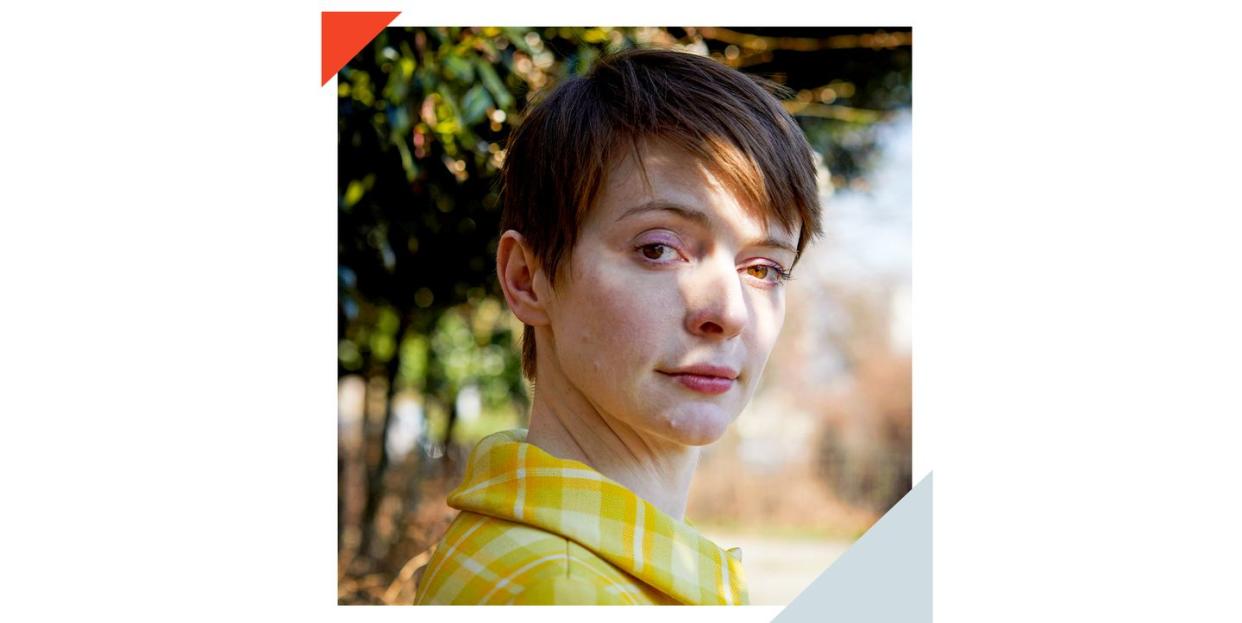
- Oops!Something went wrong.Please try again later.
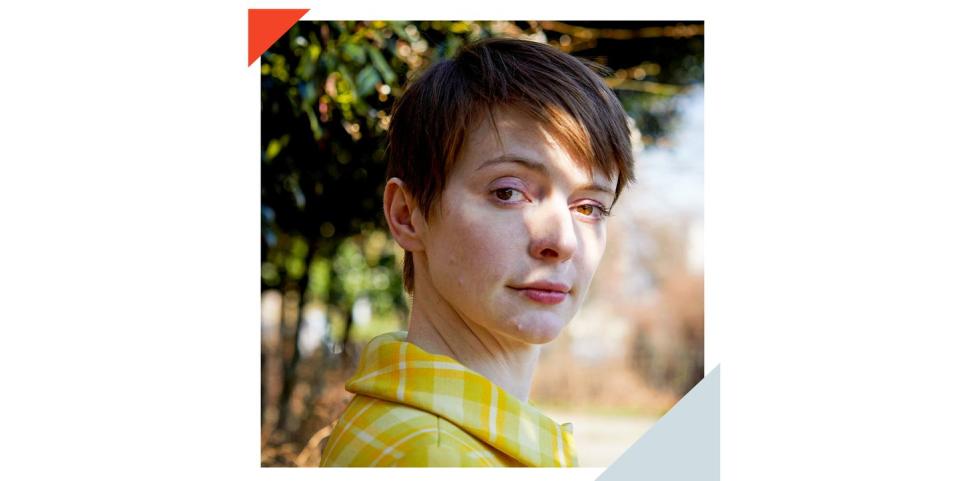
The day the world shut down, Emily St. John Mandel was no better prepared than anyone else. Like so many people free-falling through March 2020, Mandel pulled her daughter out of school, battened down the hatches at her Brooklyn home, and descended into blindsided shock. Then, something strange happened: suddenly, invitations to write essays and op-eds poured into her inbox. Readers tweeted at her in droves, with some informing her that Station Eleven, her 2014 novel about a ravaged world rebuilding after a global pandemic, was becoming their Covid-19 life raft; others announced that they were staying the hell away from it. Throughout it all, the eerie refrain: “Station Eleven predicted the future.” When life suddenly, terrifyingly resembled her fiction, the literary world was desperate for Mandel to make sense of it all.
No one would expect a novelist’s stock to skyrocket because of a global pandemic, yet that’s exactly what happened to Mandel. But being hailed as a prophetic visionary didn’t sit well with her. Who was she, a novelist who’d fictionalized a thoroughly researched but “not particularly scientifically plausible” pandemic, as she describes it, to be viewed as an authority? Meanwhile, Mandel’s fifth novel, The Glass Hotel, landed with fateful timing that same month; when her book tour swiftly went virtual, she spent night after night fielding tidal waves of readers’ pandemic malaise over Zoom and Twitter. “If it helps, as alarming as this moment is, I remain certain that this isn't going to end with a traveling Shakespearean theatre company traversing the wasteland of the post-apocalypse,” Mandel offered kindly to one supplicant. The response was textbook Mandel: wry, warm, and unfailingly generous. All these months later, remembering that disorienting chapter of pandemic life from her verdant Brooklyn terrace on a crisp November morning, Mandel is still making sense of the whirlwind.
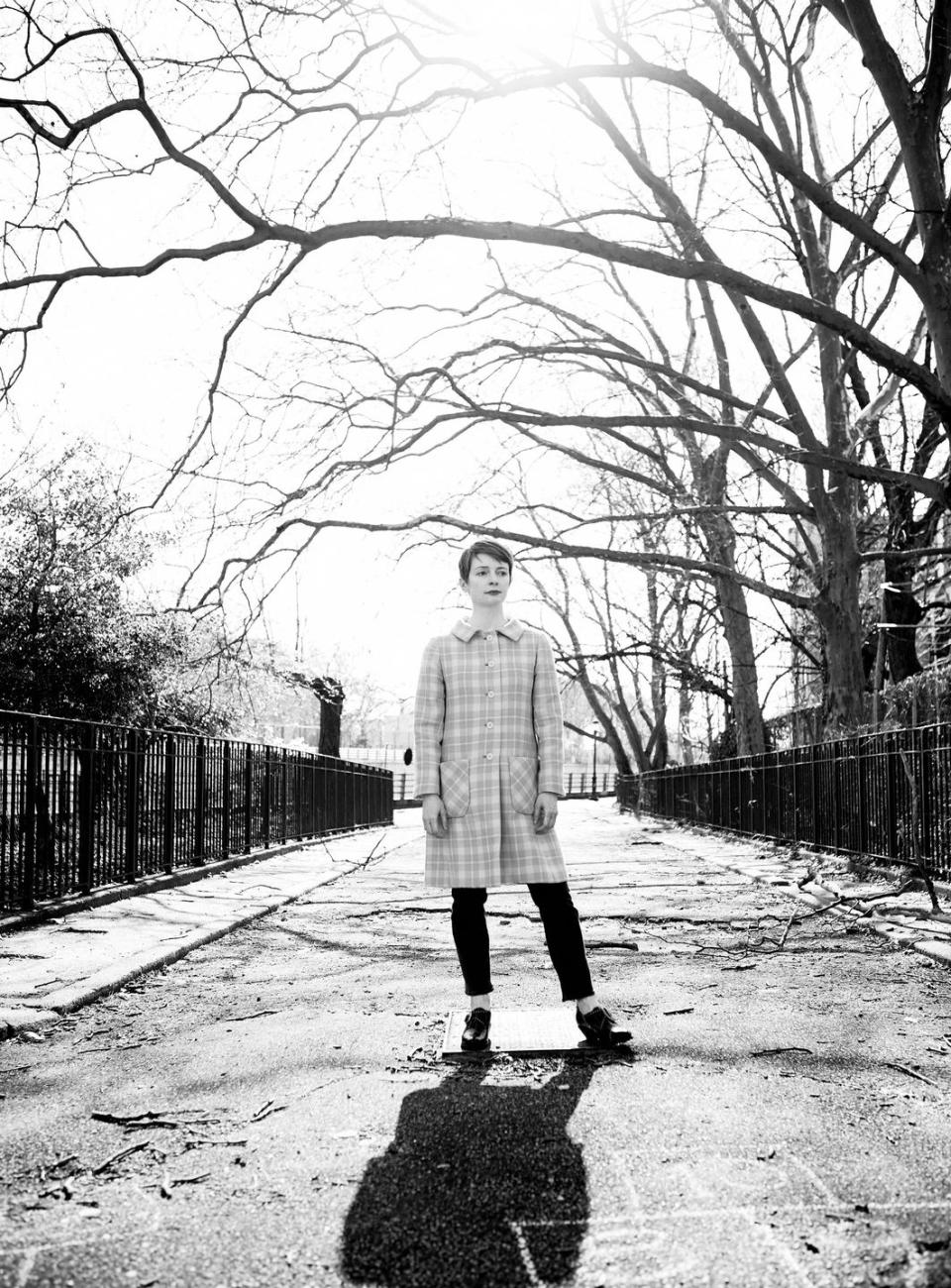
“I felt profoundly uncomfortable about it,” Mandel says, wrapped in a blanket scarf against the autumn chill, nursing a steaming mug of lemon ginger tea. “I felt like if I did any of those assignments, there would be this whiff of using the pandemic to move units of Station Eleven, which just felt so gross. I really resisted talking about it in any public way. I felt uncomfortable being cast as an expert. At the same time, I was doing Zoom events every night, where it became clear that people really wanted to talk about pandemics. Eventually, I surrendered."
Anyone who’s read Station Eleven knows that Mandel is wary of prophets. Set before, during, and after the lethal Georgian Flu snuffs out 99% of the world’s population, taking the familiar contours of human civilization along with it, Station Eleven is the incandescent tale of the Traveling Symphony, a nomadic troupe of actors and musicians who perform Shakespeare for the scattered settlements of the Great Lakes region. Along the road, they encounter a violent cult leader known only as the Prophet, who preaches that the virus was an act of God—a divine cleansing of the unworthy. Where so many post-apocalyptic novels traffic in the forces that divide us, Station Eleven celebrates that which allows us not just to survive, but to live: making art, belonging to something bigger than ourselves, searching tirelessly for what it means to be human. In the early days of lockdown, Mandel couldn’t fathom why anyone would reach for art that socked us right in our waking nightmare. It wasn’t until she streamed Steven Soderbergh’s Contagion and recognized the same impulse in herself that she came to understand Station Eleven’s end-of-days allure.
“It's a story where civilization collapses, but our humanity persists—maybe there's something there that people wanted to absorb,” Mandel says. “At the same time, at the beginning of the pandemic, I remember the difficulty of adapting to a life of pure uncertainty. I wanted clues about how this might go, or how it might end. I wanted certainty about the future. Maybe that’s why people reached for Station Eleven, to try to force ourselves to confront what could happen.”
Nominated for a National Book Award, Station Eleven catapulted Mandel from a midlist writer with a day job to a full-fledged literary superstar. The novel has now sold over 1.5 million copies and become such a bona fide sensation that readers tattoo lines of Mandel’s prose on their skin (the sight never fails to move and astonish her, she says). Now, Station Eleven is crossing over to HBO Max, where a ten-episode miniseries launches on December 16. With the story poised to reach a wider audience than ever before, no doubt Mandel’s supposed clairvoyance will again be called into question, though she believes that argument doesn’t hold water. “What becomes really obvious, if you research pandemics, is that there was always going to be another pandemic,” Mandel says. “It's just something that happens in our history. There will be something else after Covid-19, and something else after that. It's like if a novelist had written a novel in the sixties about a fictional war. Does that mean they predicted the Vietnam War? No—there was always going to be another war.”
Two grueling years into the pandemic, HBO Max’s Station Eleven lands heavily with a heartbroken, careworn audience. Much like the novel’s early lockdown resurgence, when readers both devoured and avoided the story, Mandel suspects the television series will either enthrall or repel viewers, depending on their psychological state. As she often says on Twitter, “Your mileage may vary.” Too embroiled in writing The Glass Hotel when the series came knocking, Mandel had no official involvement in the adaptation process, meaning that when the batch of ten episodes landed on her television, she was as apprehensive as any other pandemic-scarred viewer. But the show moved her deeply, and rang true to the novel’s indefatigable spirit. “It’s weird to say this about a story where almost everybody on earth dies, but it’s rendered with such joy,” Mandel says. “There's just a lot of love in that story.”
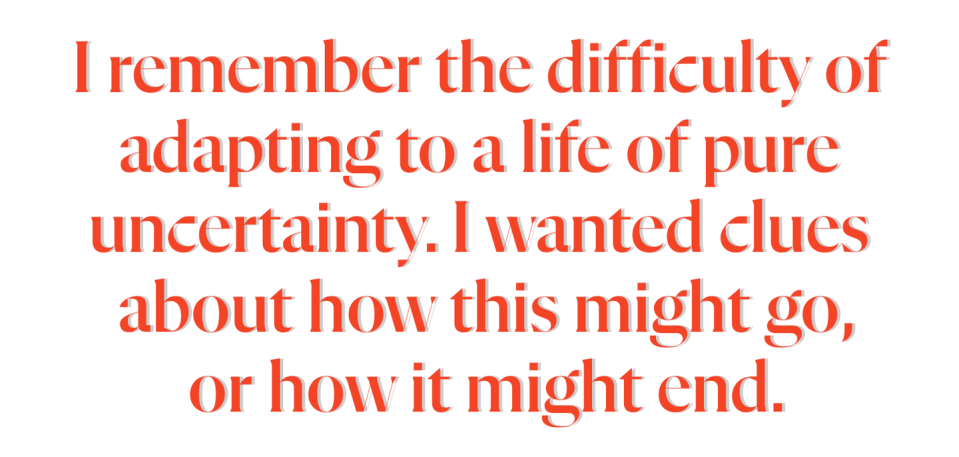
Fans of the novel will clock a multitude of sensible, but significant changes in this adaptation. Created and written by Patrick Somerville, a novelist and television writer whose other credits include Maniac and The Leftovers, the series transplants the story from Toronto to Chicago. Perhaps most notably, a chance encounter from the novel becomes the series’ emotional architecture. Jeevan and Kirsten, a paparazzo and a child actress who intersect briefly as the Georgian Flu advances, become chosen family in Somerville’s telling, poignantly paired off as they fight for survival in this sorrowed world. “Honestly, I wish I’d thought of that,” Mandel jokes.
Mandel and Somerville met in Chicago over a decade ago, long before Mandel’s breakthrough book or Somerville’s crossover to television. Back then, they were two mid-career novelists sharing billing at a bookstore reading in the Chicago suburbs. Connected by a mutual friend, Somerville picked Mandel up at the airport on the day of the event. “We immediately fell into talking about hitting the dream of becoming writers, but not knowing if it fit with making a living,” Somerville remembers. Somerville hoped to venture into television writing, while Mandel planned to write one more book. After the reading, they kept in touch intermittently via text, then reunited years later when their professional paths crossed again. Both had kept their word: Mandel wrote “one more book,” and Somerville acquired the rights to adapt it.
“Emily was a massive literary star at this point, but she seemed exactly like the person I had met for a day, ten years before,” Somerville remembers. “She seemed unchanged. She said, ‘I don't know how to write scripts. I trust you. Go ahead.’ We took it from there. All along, she was unbelievably trusting and supportive.”
In January 2020, production began on Station Eleven; in March, with just two episodes filmed, the show went on a planned hiatus that unexpectedly ballooned to almost a year. It now arrives in a changed world—one where its desperate, defiant joy has never been more necessary.
“I'm a big believer in people needing stories to help us process times when our reality is unstable,” Somerville says. “That plays out in the show, too. You come to a point when you can't talk about things anymore. But when there’s no answer, that's when art’s most valuable. When the words we have don’t work anymore, we can sing a folk song or put on a play. I'm a big believer in the functional, pragmatic utility of art. It’s not just a fancy thing you go see at the museum, but a thing we need that should be jammed into Maslow's hierarchy of needs at a very, very important rung.”
During the show's creation, Mandel, for her part, was on another planet, if only in her fiction. Back in the lost paradise of January 2020, she was experimenting with a nascent autofictional novel about the epic promotional tour she undertook for Station Eleven: 114 events in seven countries across fourteen months. But the going was tough; conveying the “constant low-level sexism” of her touring experiences, along with her deep gratitude for her life and work, was like walking a tightrope. During those harrowing early weeks of the virus's first wave, with ambulance sirens blaring around the clock in Brooklyn, Mandel, like so many writers, struggled to put words on the page; then, when she was moved by a sense of "creative recklessness," inspiration flowed. What if her fictional avatar was the author of a celebrated novel about a pandemic, promoting a book amid renewed interest about that novel's on-screen adaptation, all while a real pandemic closes in—and what if she lives on a moon colony in 2203?
“I remember this desperation to get out of my apartment,” Mandel says. “We’d go to the park, but there was that feeling of being trapped in your neighborhood. You didn't really want to get on the subway. There was nowhere to go. So that was a way to get out of the neighborhood: go to the moon.”
Mandel’s trips to outer space became Sea of Tranquility, her sixth novel, set to hit shelves in April of next year. In signature fashion, the work braids together a rich ensemble of characters, revealing the surprising linkages between their disparate lives. In 1912, a high-society exile is spooked by an out-of-body experience in the Canadian wilderness; in 2203, the novelist endures the agonies and ecstasies of book tour as the pandemic encroaches; in 2401, a shiftless thirty-something becomes enmeshed with the secretive Time Institute. Fans of the Emily St. John Mandel Cinematic Universe, familiar with her playful predilection to have characters hopscotch between books, will be pleased to see some familiar faces in Sea of Tranquility. (We won't spoil who.) Like Station Eleven and The Glass Hotel before it, Sea of Tranquility locates small-scale human stories amid massive societal collapse, musing poignantly on how worlds end, and how we rebuild. Mandel was hesitant to dive headfirst into hard science fiction, fearful of being pigeonholed in one genre. But as she and her fictional surrogate know, “Sometimes real isn't what a novel needs.” The same might be said for the novelist—as the pandemic wore on, the writing released her.
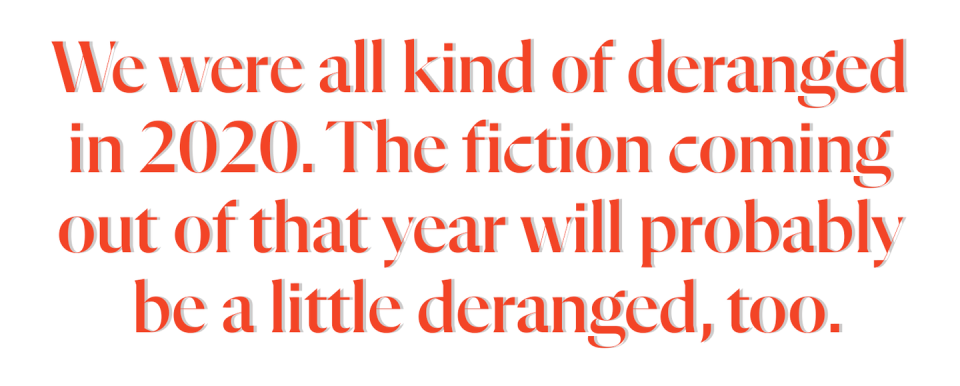
“In the normal course of events, if you’re writing a novel, that's one of the harder things you're dealing with, because writing a novel is hard,” Mandel says. “But if there's a pandemic, everything is so hard that the novel felt easy by comparison. The novel kept me sane. It was a project that I could lose myself in–the secret world I could step into while we were in that period of constant sirens, wondering if I was ever going to see my family again, wondering if my daughter would ever be able to go back to school. The book absolutely sprang out of the pandemic. I don't think I could’ve written it, if not for that.”
Sea of Tranquility is among an emerging class of novels bearing a historic distinction: they surface from our pandemic experiences, forged in the traumas and tragedies of these desolate times. As for what to expect from those creations, Mandel is as curious and clueless as anyone, but she’s managed to spot one trend. “I know two other literary novelists writing time travel novels,” Mandel says. “Emma Straub has a new time travel book coming out, which was absolutely not in her usual themes as a writer. I was speaking with another literary novelist I know, and I said, 'Are we all turning to time travel?’ She said, ‘Yes. I know two other writers who are writing time travel fiction.’ If there was ever a year to write sci-fi autofiction with moon colonies and time travel, it was 2020. We were all kind of deranged in 2020. The fiction coming out of that year will probably be a little deranged, too.”
In Sea of Tranquility, Mandel writes, “This is the strange lesson of living in a pandemic: life can be tranquil in the face of death.” Here on Mandel’s terrace, three flights up from the susurrus of Brooklyn, we sip tea, warm our hands under a thermal lamp, and ruminate on the craft of fiction. Worlds away, the life-saving vaccines permitting us to partake in this languid splendor remain bargaining chips in a war of greed and inequality. That we haven’t yet seen the end of our global suffering isn’t lost on Mandel, who remains worried about the pandemic’s inexorable march, at home and abroad. But on a morning so fine as this, how can one not be reminded of Station Eleven’s dictum: that we must have art, and communion, and gladness. It calls to mind a moment from the novel, when Doctor Eleven, the protagonist of the fictional comic book that gives Station Eleven its name, remembers “the sweetness of life on earth.”
That sweetness is all around us. It's in tea on a terrace, readers grasping for truth in the dark, a writer’s words tattooed on someone’s skin. It’s in Mandel’s urban garden, one of her great pandemic-era sources of beauty and pleasure. Around us bloom the fruits of her labor: over a dozen potted trees, dappled with radiant morning light. "I'm so incredibly grateful for this life,” Mandel muses.
This life, this world. It’s still here. So are we.
You Might Also Like

